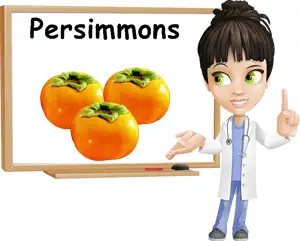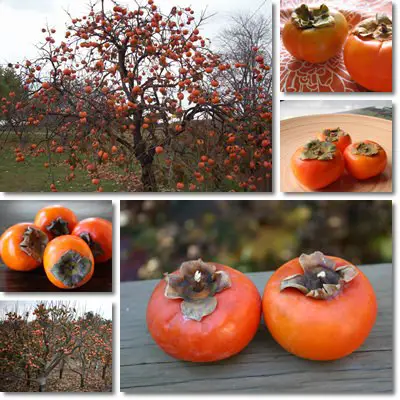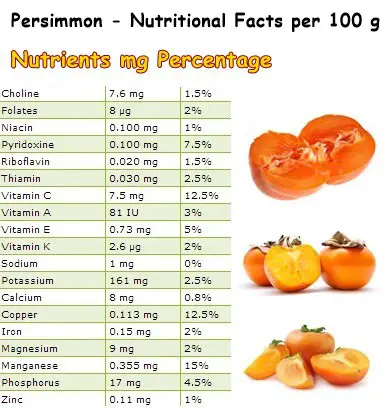Shaped like tomatoes, with a soft, slightly astringent, but sweet pulp and a gorgeous bright orange or purple skin, persimmons (Diospyros virginiana) are nutritious fruits, rich in phytochemicals with significant antioxidant, anti-inflammatory as well as antibacterial activity. The more astringent the fruit, the richer its nutritional profile. What makes the persimmon healthy is its catechin and tannin content, both powerful natural compounds with wonderful beneficial antioxidant, anti-inflammatory and anti-aging effects.
In addition to the antioxidants, the fruit boasts a generous vitamin C, copper and manganese content, three excellent antioxidants involved in a variety of essential processes in the human body. Vitamin A and the carotenoid compounds giving the fruit its beautiful orange color contribute to eye health and good immunity, further adding to the benefits of the fruit.
With a good fiber content, persimmons support digestive health, encouraging good transit time and easy digestion. Lastly, the small amounts of B vitamins and good carbohydrate and sugar content contribute to energy metabolism and ensure elevated energy levels.

Persimmon varieties
There are several edible varieties of persimmon, all of which differ slightly in terms of appearance, taste and nutritional profile.
- Japanese persimmon or kaki persimmon (Diospyros kaki). This variety is a bit tangy (due to a high tannin content), but when left to ripe, it softens and reveals a pleasant flavor. It has a bright orange pulp and is pretty much tomato-shaped.
- American persimmon (Diospyros virginiana). It is a great source of vitamin C as well as essential minerals. Sweet after ripening.
- Texas persimmon (Diospyros texana). This variety is the size of a berry, tastes sweet and turns dark purple, almost black when ripe.
- Indian persimmon (Diospyros peregrina). Not very appetizing, it turns golden when ripe.
- Black persimmon (Diospyros digyna). When ripe, the pulp turns a dark color.
- Red persimmon (Diospyros discolor), officially known as Velvet-apple.
Each variety differs slightly in terms of nutritional value. For instance, American persimmon has a much higher vitamin C content than Japanese persimmon as well as slightly more iron and potassium. Also, color makes a great difference when it comes to fruit. For example, darker fruit have anthocyanins, while orange ones are rich in beta-carotene.
What does persimmon look and taste like?
Irrespective of the variety, the taste of persimmon ranges from very astringent to mildly astringent and super sweet. In my opinion, it needs to be left to ripen completely for a more pleasant culinary experience. Some varieties are actually really sweet when perfectly ripe. Also, fruit may grow to sizes as small as a berry or as big as a tomato. The iconic persimmon is tomato-shaped and has a bright orange peel and soft, chewy, sweet orange pulp when ripe.

What are the benefits of persimmon?
Here are the top nutrition facts and health benefits of the common persimmon (Diospyros virginiana):
Good vitamin C content
The common persimmon provides around 10% of the RDA of vitamin C per 100 g of fruit. Vitamin C is an excellent antibacterial which helps the body develop resistance against infectious agents and builds up immunity. Also, studies show that vitamin C is an excellent free radical scavenger (antioxidant activity) as well as anti-inflammatory. Inflammation has been identified as a major factor in chronic disease (cancer, diabetes, heart disease, obesity).
Great source of vitamin A and carotenes
Persimmon contains pro-vitamin A, a form of vitamin A derived from carotene antioxidants such as beta-carotene. Beta-carotene is a natural orange pigment with both antioxidant and (pro)vitamin A activity. Regular consumption of the fruit contributes to good eyesight due to its vitamin A content and provides antioxidant benefits as a result of the presence of beta-carotene.

Excellent antioxidant content
Antioxidants in persimmon include vitamins A, C, E, as well as copper and manganese. While vitamins act as free radical scavengers, destroying these harmful molecules directly, copper and manganese are cofactors for the superoxide dismutase enzyme, a sort of natural defense system our body puts in place to protect against cell and DNA damage. Carotenoids such as zeaxanthin and lutein prevent loss of central vision related to old age (macular degeneration) and prevent retina damage caused by free radicals from sunlight.
Varied mineral content
Persimmons provide small amounts of almost all essential minerals, namely calcium, copper, iron, magnesium, manganese, phosphorus, potassium and zinc. Copper not only offers antioxidant protection, but also helps in delaying aging in the form of premature hair graying.
Low in calories
With only 70 kcal/100 g of pulp, persimmon poses no threats to one’s waistline, as long as you don’t put it into a pie. Scoop the sweet, ripe pulp with a spoon and enjoy.
Good fiber and low fat content
The fruit is less than 0.2% fat and provides 3.6 g of dietary fiber/100 g of pulp. Fiber makes it especially healthy because it aids digestion, relieves constipation and helps reduce blood cholesterol levels.
Rich source of tannins
Unripe persimmons have such a bitter or astringent taste that it renders them inedible. If you take a bite out of an unripe persimmon, you will feel your mouth drying altogether and cringe trying to swallow even the smallest piece of fruit. This is a result of the fruit’s extremely high tannin content, meant to help repel insects and predators. How to get rid of the bitter taste of persimmons? Choose the right varieties and let them ripe until the pulp is soft and jelly-like.
Persimmon varieties by taste
- Astringent persimmon varieties: Hachiya, Koushu-Hyakume, Saijo, Tanenashi etc.
- Sweet persimmon varieties: Fuyu, Hyakume (or cinnamon persimmon), American persimmon varieties (Early Golden, Ennis, Miller, Woolbright), Mérida (black persimmon), Organic Sweet Pumpkin Persimmon, etc.
